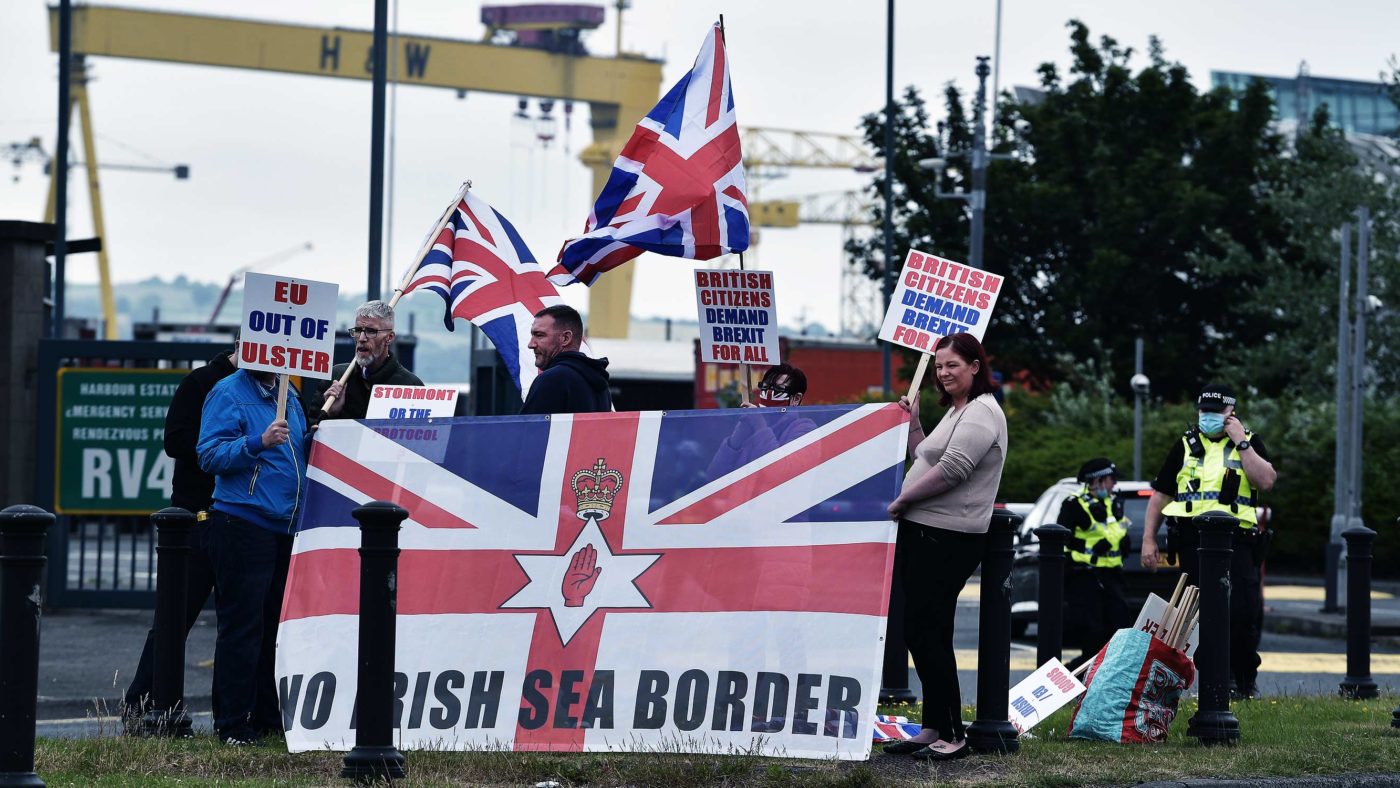At 6.30am on Monday morning, the Northern Ireland Protocol saga took a sinister new twist. In the predominantly unionist town of Newtownards, two masked and armed men hijacked a double-decker bus and set it alight, seemingly in protest against the Irish Sea border.
The leaders of unionist political parties, including the DUP leader Jeffrey Donaldson, quickly condemned this act, highlighting the trauma experienced by the driver. He urged opponents of the Protocol to secure progress, ‘through political action and not violence’.
The timing of the incident was unlikely to have been coincidental. Previously, Donaldson threatened to collapse the Northern Ireland Assembly if the main issues with the Protocol were not resolved by the 1st of November. The DUP has now pushed this deadline back, demanding action ‘within weeks’ instead.
‘Given the progress that we’re making toward the objectives that we want to achieve,’ explains Donaldson, ‘I’m prepared to give a little more time to achieve those objectives.’
In contrast, some hot-headed elements within Ulster loyalism have clearly run out of patience with a political process that seems interminable. The wanton destruction in Newtownards was self-defeating and will achieve nothing, but you can see why they might think otherwise.
The idea that new checks or infrastructure must fall between Great Britain and Northern Ireland, rather than at the Irish land border, was repeatedly backed up by invoking the supposed threat of republican terrorism. At one EU meeting, the then Irish prime minister, Leo Varadkar, even produced an old press clipping about an IRA attack on a customs post to emphasise this point.
Loyalist communities in Northern Ireland could hardly be oblivious to the success of this tactic. In April, petrol bombs and bricks were hurled at the police during riots that were fuelled at least in part by anger at the Protocol. The veteran Ireland correspondent, Henry McDonald, cites ‘long-standing sources within that underworld’, who say the paramilitaries are rearming.
When the nationalist MP for South Belfast, Claire Hanna, accused the bus burners of being ‘extremists exploiting the mess of their own creation’, one prominent loyalist activist, Jamie Bryson, pointed out that Hanna herself had predicted ominously there would be, ‘civil disobedience at the very minimum’, if checks were imposed on the island of Ireland.
The SDLP MP made her comments to Business Insider in 2019, saying, ‘If 60% of people do not want a border on the island, and you say ‘tough shit we are putting you inside a hard border,’ you cannot expect people to just choke that down and get on with their lives.’
This kind of bluster, from a constitutional nationalist, was widely seen as acceptable when it was deployed in opposition to Brexit. After the Protocol effectively divided up the United Kingdom and placed Northern Ireland’s economy under the authority of the EU, unionists were told to ‘dial down the rhetoric’.
The British government must take much of the blame for failing to counter propaganda from Irish nationalists and the administration in Dublin, when they claimed that even an extra camera on the land border would threaten peace and the Belfast Agreement.
This week, Policy Exchange published a paper that described the origins of this failure in exhaustive detail. Theresa May and her government allowed the narrative to become established throughout initial negotiations with Brussels, then conceded it as a legal principle in the ‘Joint Report’ of 2017. This document committed the UK to a backstop that would keep Northern Ireland aligned to the rules of the EU single market and customs union.
In a rather self-exculpatory foreword, Lord Frost wrote that the Protocol, which left Ulster under Brussels’ economic control, but freed the rest of the country, was ‘the best that we could do’. He argued that Boris Johnson’s government was constrained by the Benn Act, which was designed to prevent a ‘no deal’ Brexit, and a tight time frame at the end of 2019 that meant, ‘there was an increasing worry that it would not be possible to deliver on the referendum result at all.’
It was a combination of these circumstances, coupled with the fact that many Conservatives were persuaded that they could secure Britain’s departure from the EU and sort out Northern Ireland’s position later, that left the province in its current dangerous and unpredictable situation.
When Dublin and its allies argued that the threat of republican violence should determine Northern Ireland’s future, it was wrong. It would be equally wrong to imply that the UK and the EU should be swayed by armed men who attack buses.
However, anger and despair at the Protocol extends far beyond paramilitary thugs, to otherwise moderate and restrained unionists who feel that they have been consigned to second-class British citizenship. They badly want to believe that the Government will restore their full place in the United Kingdom.
Lately, there are indications that ministers understand the seriousness of Northern Ireland’s predicament and are prepared to act unilaterally to repair the Union. But with every week that goes by without progress, unionists in the province have a little less hope.
Click here to subscribe to our daily briefing – the best pieces from CapX and across the web.
CapX depends on the generosity of its readers. If you value what we do, please consider making a donation.


